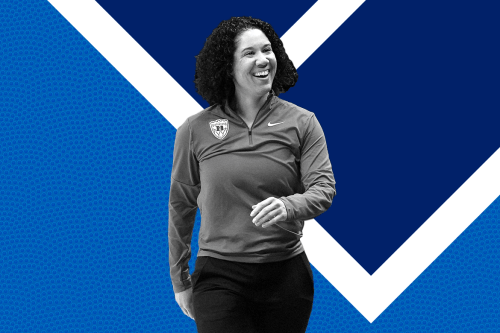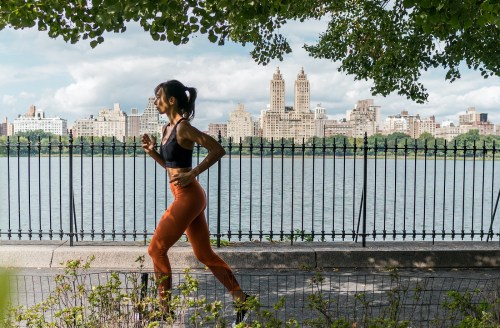Every year in November, over 50,000 runners lace their sneakers and gather at the New York City Marathon’s starting line on the shore of Staten Island. This November will be different, though. Today, New York Road Runners (NYRR) announced the cancellation of the largest marathon in the world, due to health and safety concerns posed by COVID-19. This year, there will be no crowds, no hand-painted signs, no joyful tears at the finish line.
Ask any New Yorker (runner or not) and they’ll tell you that the marathon is one of New York City’s crown jewels. It’s an event that brings thousands of people onto the streets to cheer athletes on. The fact that there will be no 26.2 this year proves especially painful on the coattails of a year that has arguably been one of the most difficult in the city’s history. Over 30,000 residents have lost their lives to COVID-19, and still more have found themselves without work or without many of the small joys that living in the city brings.
“Canceling this year’s TCS New York City Marathon is incredibly disappointing for everyone involved, but it was clearly the course we needed to follow from a health and safety perspective,” Michael Capiraso, president and CEO of NYRR said in a press release. “Marathon Day and the many related events and activities during race week are part of the heart and soul of New York City and the global running community, and we look forward to coming together next year.”
Gold Medal Couple Tara Davis-Woodhall and Hunter Woodhall Talk Marriage, Motivation, and Their Next Chapter With Nike

Coach Kara Lawson Wants You to ‘Handle Hard Better’—and Here Are 3 Ways to Do Just That

JuJu Watkins Leaves March Madness With ACL Tear—and This Knee Injury Is More Common Than You Think

It’s true that marathon day makes up the very DNA of New York City, but races in general also fuel the passion of the 60 million runners across the United States. So as 2020 looks more and more like a year without 5Ks, 10Ks, half-marathons, or—yes—marathons, runners everywhere have been forced to take a step back and reevaluate the reasons they run that don’t include mastering a certain mileage, earning a trophy, or immersing themselves in the energy that only comes from a crowd of other pavement-pounders.
“Fall marathon racing season is usually a magical time because I’m coaching hundreds of runners,” says Jes Woods, manager of NYC’s treadmill studio Mile High Run Club and Nike coach. “On race day, I get to see everybody’s hard work come to fruition. It’s like my Christmas.” Now, with all three of the business’ locations closed for TBD amount of time, Woods has started to encourage her fellow runners to really mull over what makes the sport worthwhile even as a solo, socially-distanced activity. “It’s a moment to spend some time trying to remember why you run above-and-beyond race day itself. 2020 is just going to have to be the year we reflect on why we fell in love with running in the first place,” she adds.
Val Verdier, director of teaching at Modo Yoga and half-marathon runner, planned on New York City 2020 being her first-ever full marathon. “I started running in university, and when I started running again, it was because I needed space to myself, not in the yoga room, since yoga for me right now is so much like work,” she says. “I needed an extra space to channel anger, fear, or whatever—and lacing up my shoes gave me that.” Now, Verdier tells me that her shoes have been sitting unused for nearly three weeks, and she’s not quite sure where to source the motivation that will inspire her to lace them back up and set out for a run. The marathon remains a dream of hers, but she’s being patient with herself as she searches for the sport’s purpose in her current reality.
Of course, there are also those for whom running races constitutes their entire career—like two-time Olympian in track and field Colleen Quigley. When I call Quigley, she’s just finished her first (and hardest) training session of the day and has one more planned for later this afternoon. “As the summer has worn on, I feel like the hope of racing has slowly dwindled,” she says, “which definitely makes it hard to stay motivated and to continue to push yourself into workouts. There’s a question of: What is the point of making myself really hurt today when I don’t have a goal that’s imminent?”
For Quigley, the answer is simple, although not necessarily easy: As runners, this is what we do. Training unites runners of all kinds “from your weekend warrior who does a 5K before Sunday brunch all the way up to those New York City marathoners, we’re all doing this together,” says Quigley. That’s why she’s encouraging those who can’t race officially to find joy in the training itself, and to feel the energy of training with hundreds of thousands of others even when you’re physically alone. “Try to simulate that race on your own. Even something that simple can help you get through the training—especially if you tell people you’re going to do it. That can be enough to keep you accountable and keep you motivated,” Quigley says.
2020 may be the year without races, but it could also be the year of running for yourself. The year of imagining community differently.
Sign Up for Our Daily Newsletter
Get all the latest in wellness, trends, food, fitness, beauty, and more delivered right to your inbox.
Got it, you've been added to our email list.








